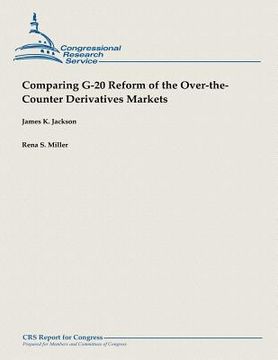Reseña del libro "Comparing G-20 Reform of the Over-the-Counter Derivatives Markets (en Inglés)"
Derivatives, or financial instruments whose value is based on an underlying asset, played a key role in the financial crisis of 2008-2009. Congress directly addressed the governance of the derivatives markets through the Dodd-Frank Wall Street Reform and Consumer Protection Act (Dodd-Frank; P.L. 111-203; July 21, 2010). This Act, in Title VII, sought to bring the largely unregulated over-the-counter (OTC) derivatives markets under greater regulatory control and scrutiny. Pillars of this approach included mandating that certain OTC derivatives be subject to central clearing, such as through a clearinghouse, which involves posting margin to cover potential losses; greater transparency through trading on exchanges or exchange-like facilities; and reporting trades to a repository, among other reforms. In the debates over Dodd-Frank and in subsequent years, many in Congress have raised the following important questions: If the United States takes stronger regulatory action than other countries, will business in these OTC derivatives markets shift overseas? Since OTC derivatives markets are global in nature, could derivatives trading across borders, or business for U.S. financial firms that engage in these trades, be disrupted if other countries do not adopt similar regulatory frameworks? The first step in addressing these congressional concerns is to examine the degree to which other major countries have adopted similar legislation and regulation as the United States, particularly in light of commitments from the Group of Twenty nations (G-20) to adopt certain derivatives reforms. Following the financial crisis, G-20 leaders (generally political heads of state) established a reform agenda and priorities within that agenda for regulating and overseeing OTC derivatives. The G-20 as an organization has no enforcement capabilities, but relies on the members themselves to implement reforms. According to recent surveys, most members are making progress in meeting the self-imposed goal of implementing major reforms in derivatives markets. Only the United States appears to have met all the reforms endorsed by the G-20 members within the desired timeframe of year-end 2012. The European Union (EU), Japan, Hong Kong, and the United States have each taken significant steps towards implementing legislation requiring central clearing. However, in most of these jurisdictions legislation has not yet been followed up with technical implementing regulations for the requirements to become effective, according to the Financial Stability Board (FSB), which conducts the surveys. Most authorities surveyed estimated that a significant proportion of interest rate derivatives would be centrally cleared by year-end 2012, but they were less confident of progress for other asset classes. The EU appeared to be making progress in its G-20 derivatives regulatory commitments, particularly in central clearing and trade repository-reporting requirements, but at a slower pace than the United States, according to the FSB. This may be due in part to the need for legislation to be passed by individual national legislatures even when agreed broadly by the EU. As of October 2012, however, only the United States had adopted legislation requiring standardized derivatives to be traded on exchanges and electronic platforms. This report examines the G-20 recommendations for reforming OTC derivatives markets and presents the result of self-assessment surveys measuring the performance of G-20 members and some FSB members to date in meeting their commitments. The Appendix to the report presents more detailed information on the status of individual jurisdictions in implementing the G-20- endorsed reforms. The Glossary defines key international bodies and related financial terms and concepts.

